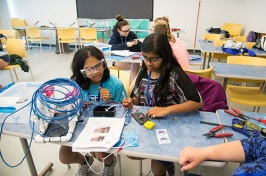UNH Research: Conspiracy Beliefs Higher Among Millennials and Trump Supporters

DURHAM, N.H.— Is the Earth flat? Did NASA fake the moon landings? Do COVID-19 vaccinations implant microchips in people? A recent survey by the University of New Hampshire looked at the public acceptance of these types of conspiracy claims compared to statements based on scientific facts. They found only around 10% agreed with conspiracy claims and while that was low overall, it was significantly higher among certain subgroups including millennials and supporters of former President Donald Trump.
“Pseudo-scientific conspiracy claims get a lot of attention in the headlines and on social media, like Facebook and Twitter, where they are avidly shared by believers and trolls, giving the impression that support for such claims is growing,” said Lawrence Hamilton, professor of sociology and senior fellow at the Carsey School of Public Policy. “But we found that only nine to 12% of people agree with these claims.”
In their nationwide study, researchers asked people to respond to a series of statements that seemed to be related to science but were a mix of conspiracy beliefs (like vaccination microchips) right alongside well-established basic scientific facts (like the Earth is very old). Despite the recent mistrust and doubt in science during the pandemic, the respondents surveyed nationwide agreed mostly with the statements based on scientific facts, ranging from 58% for statements on human evolution, to 83% for statements like the Earth revolving around the sun.
Researchers say conspiratorial thinking, or conspiracist ideation, has become a prominent feature of current U.S. politics, shaping how many people think about elections, the COVID-19 pandemic and other issues. Researchers chose conspiracies that did not have any overt political connections, such as Trump’s claims about the “stolen” 2020 presidential election. Still, Trump followers were more likely to agree with the conspiracies and less likely to agree with basic science.
“Besides politics, age or generational patterns are prominent but it is not clear why millennials would be more open to flat Earth and microchip conspiracies,” said Hamilton. “One thought is that social media could play a role with younger generations frequenting more conspiracy-rich corners of the internet.”
Researchers point to broad anti-vaccine claims that are widely available on social media that have been discredited in the scientific literature. Millennial, as well as Generation Z, respondents were also less likely to agree that vaccines have mostly been a benefit to human health, as opposed to older generations who have more experience with diseases like polio, mumps and measles. Regarding claims like the implanted microchip, researchers point to the possibility that younger generations may be more accustomed to the increase in constant public and private surveillance in society. Researchers caution on any generational perceptions, noting that younger respondents were significantly more likely to agree with the scientific consensus that climate change is happening now and caused mainly by human activities.
The nationwide POLES 2021 survey, focused on science knowledge and perceptions, was supported by the National Science Foundation.
The University of New Hampshire inspires innovation and transforms lives in our state, nation and world. More than 16,000 students from all 50 states and 71 countries engage with an award-winning faculty in top-ranked programs in business, engineering, law, health and human services, liberal arts and the sciences across more than 200 programs of study. A Carnegie Classification R1 institution, UNH partners with NASA, NOAA, NSF and NIH, and received $260 million in competitive external funding in FY21 to further explore and define the frontiers of land, sea and space.
Latest News
-
October 8, 2025
-
October 2, 2025
-
September 24, 2025
-
September 15, 2025
-
August 21, 2025














































